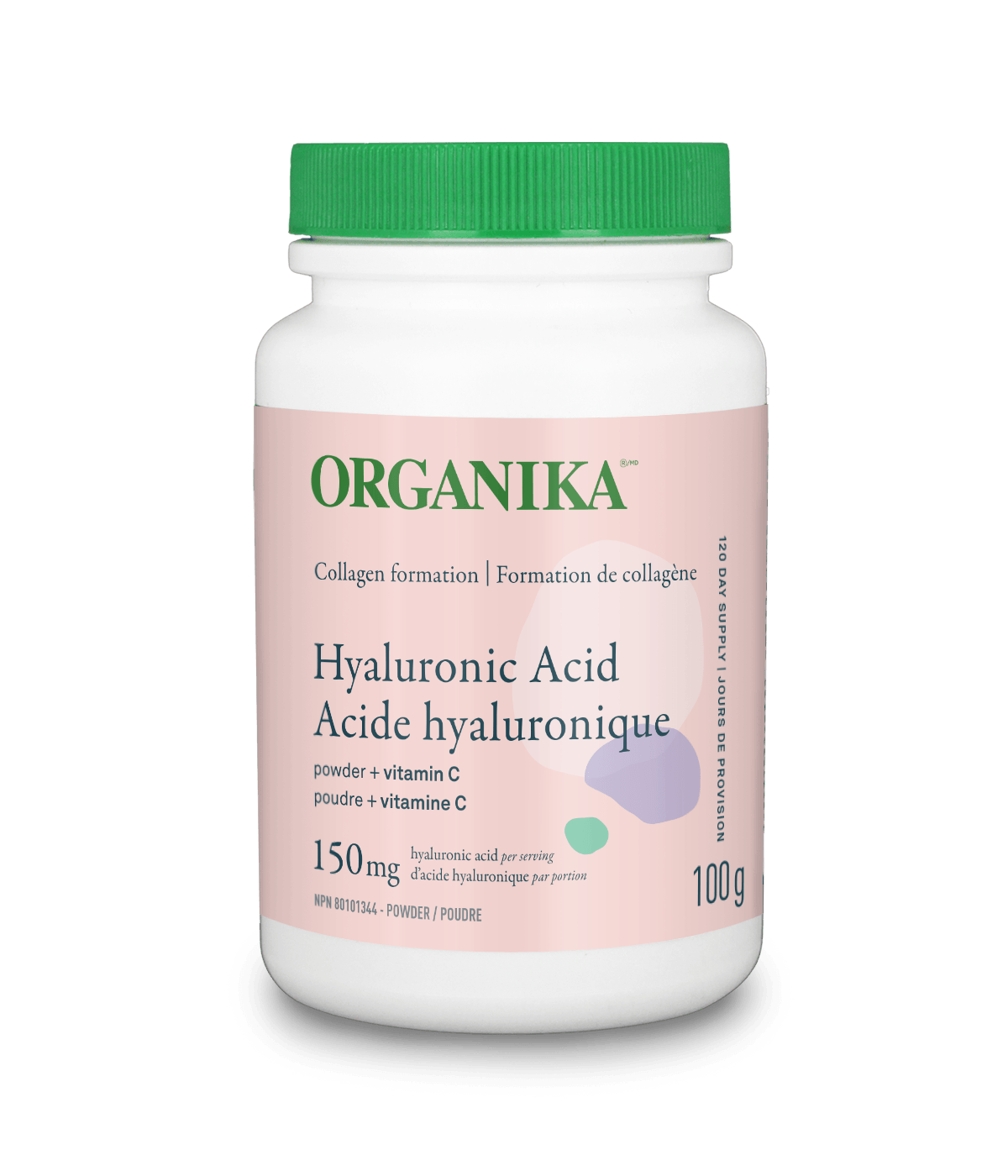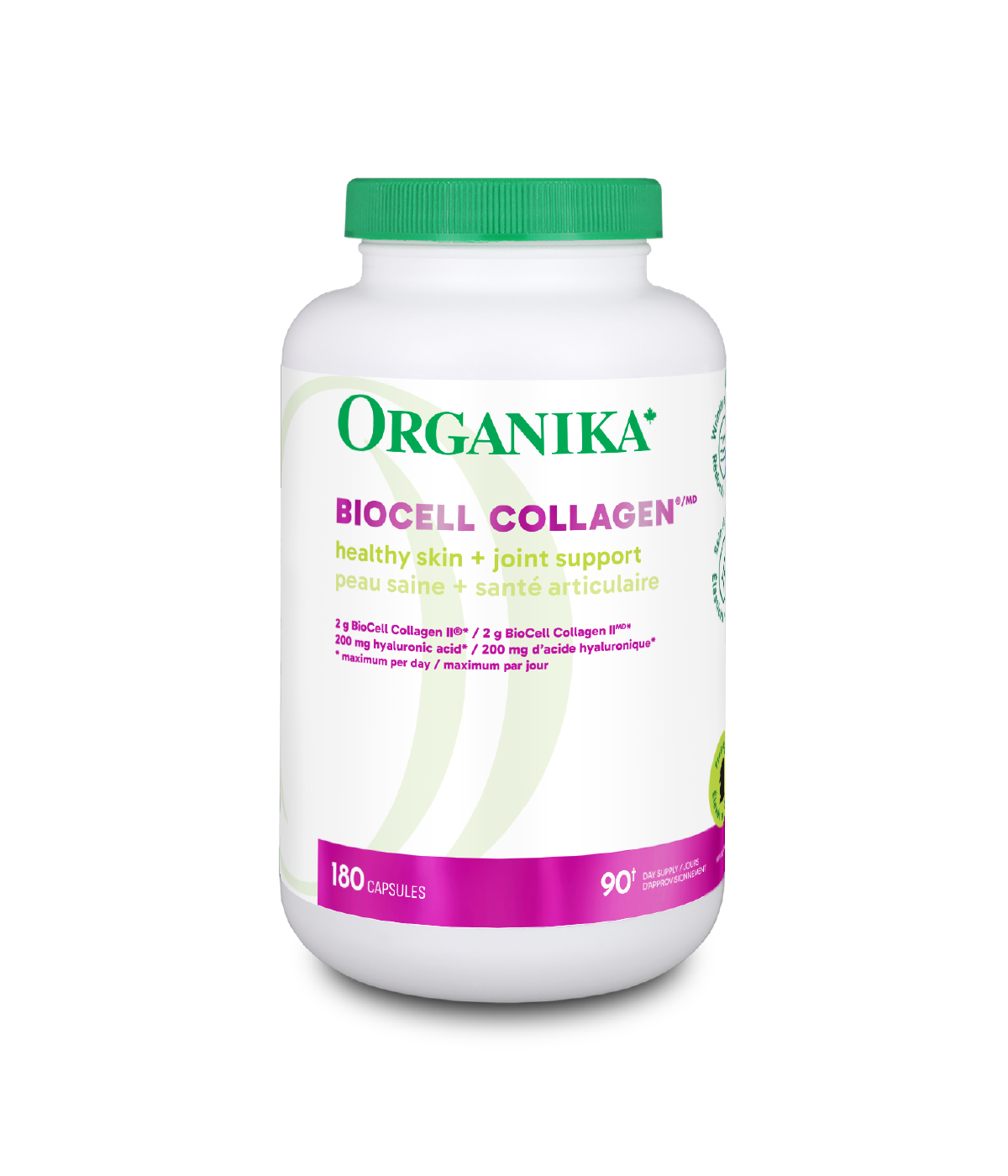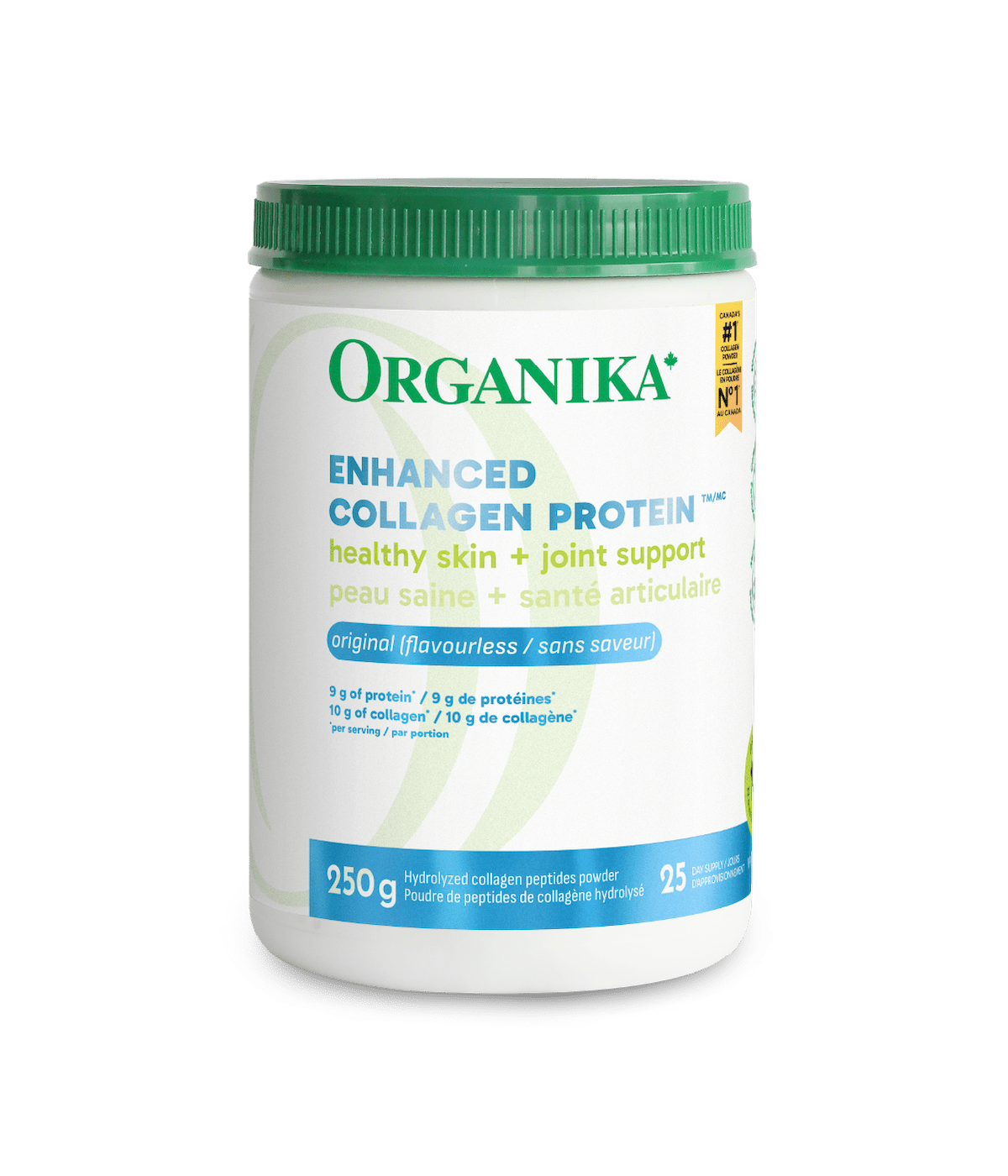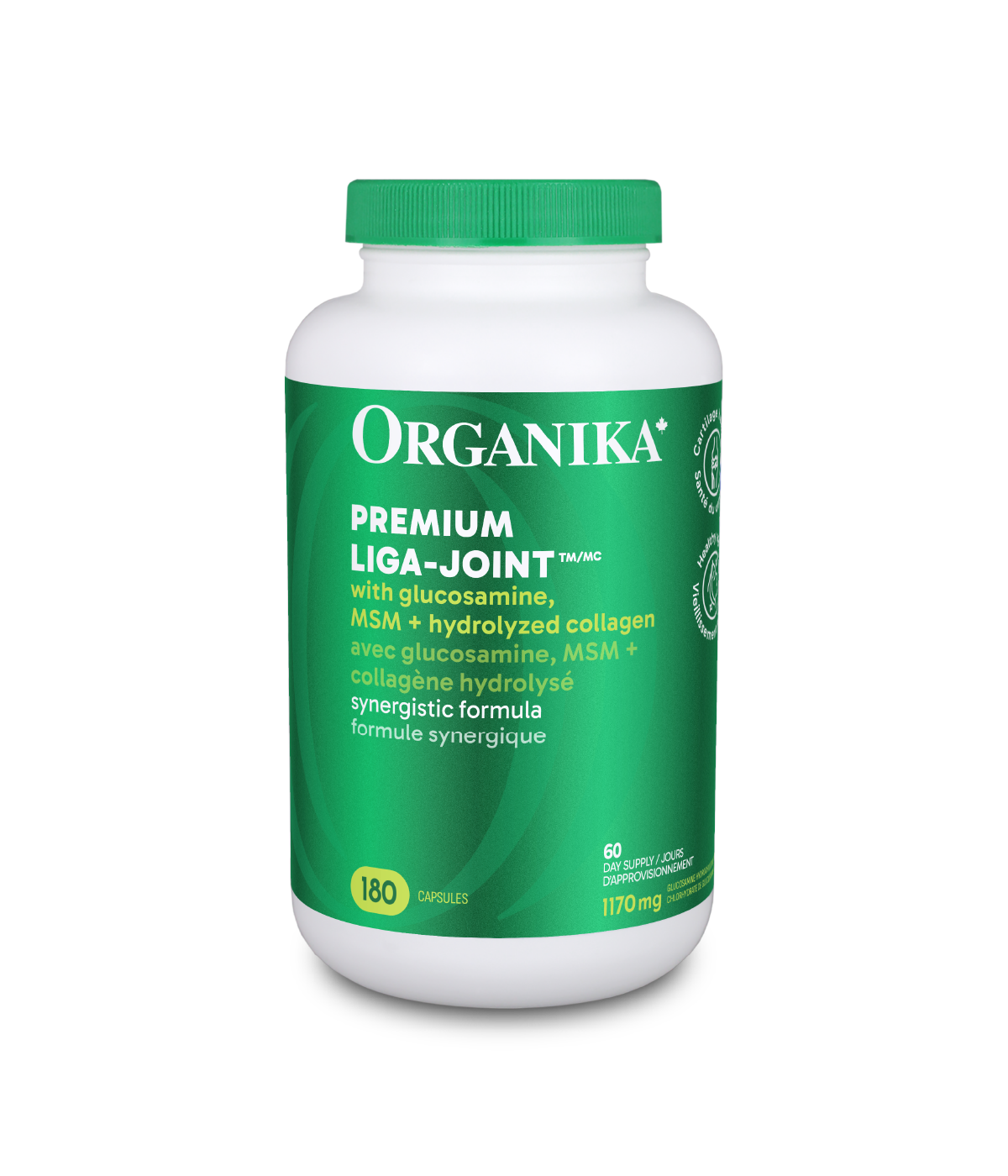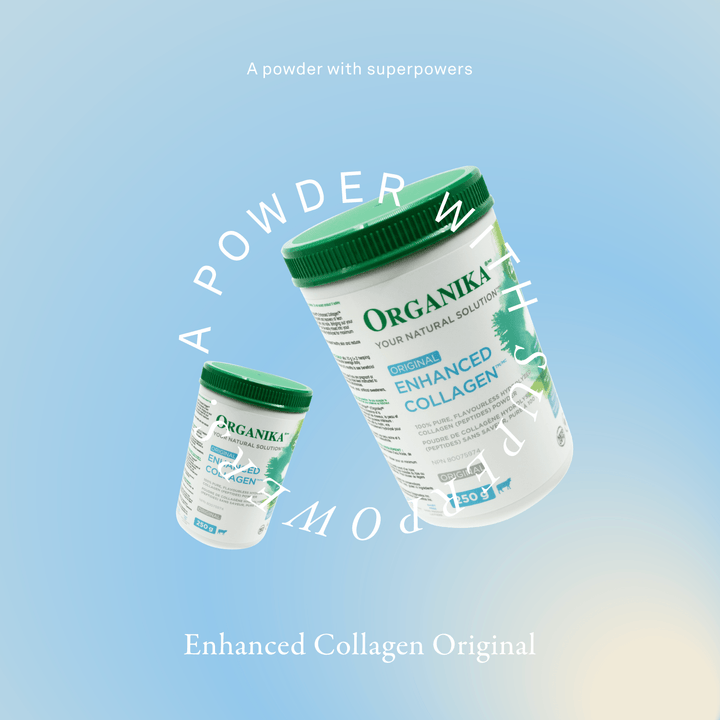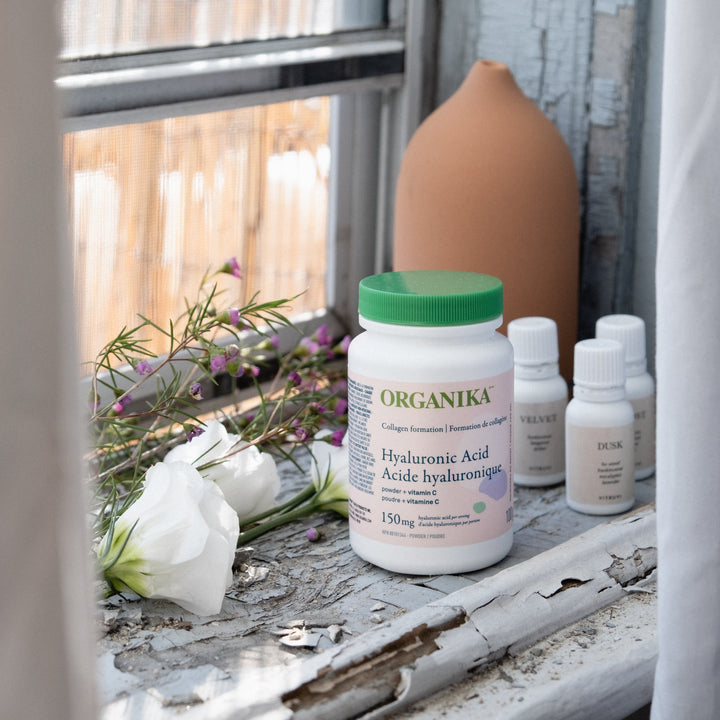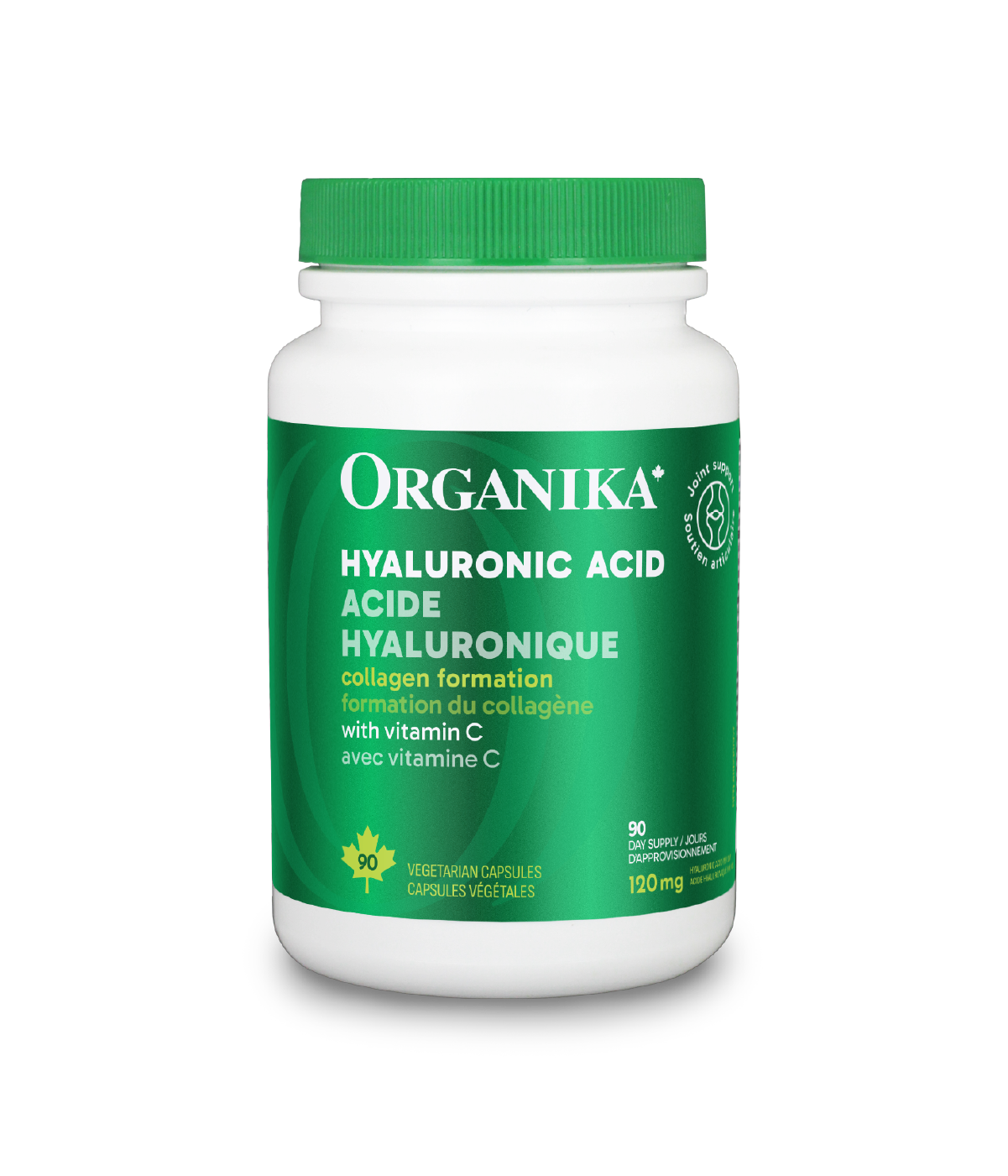
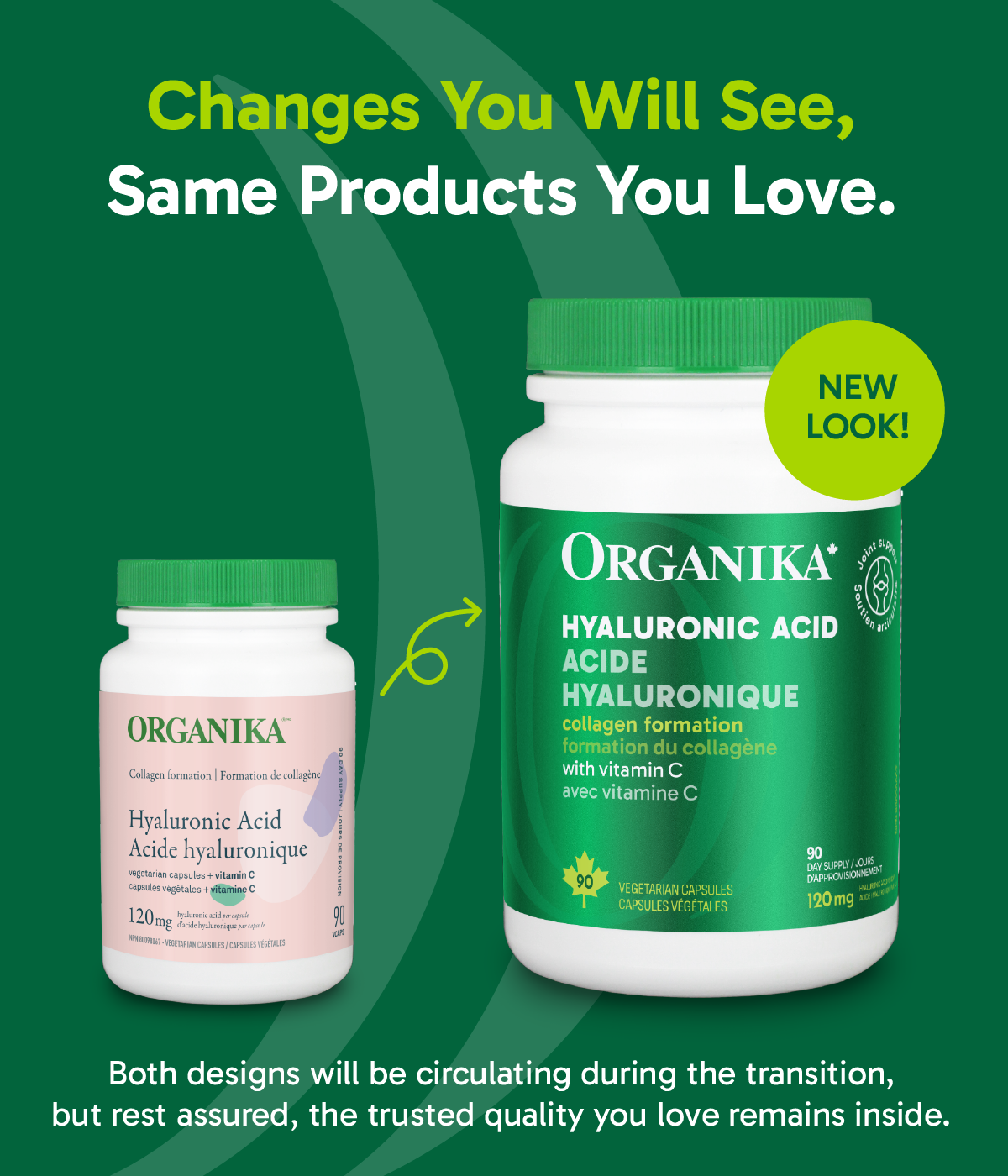
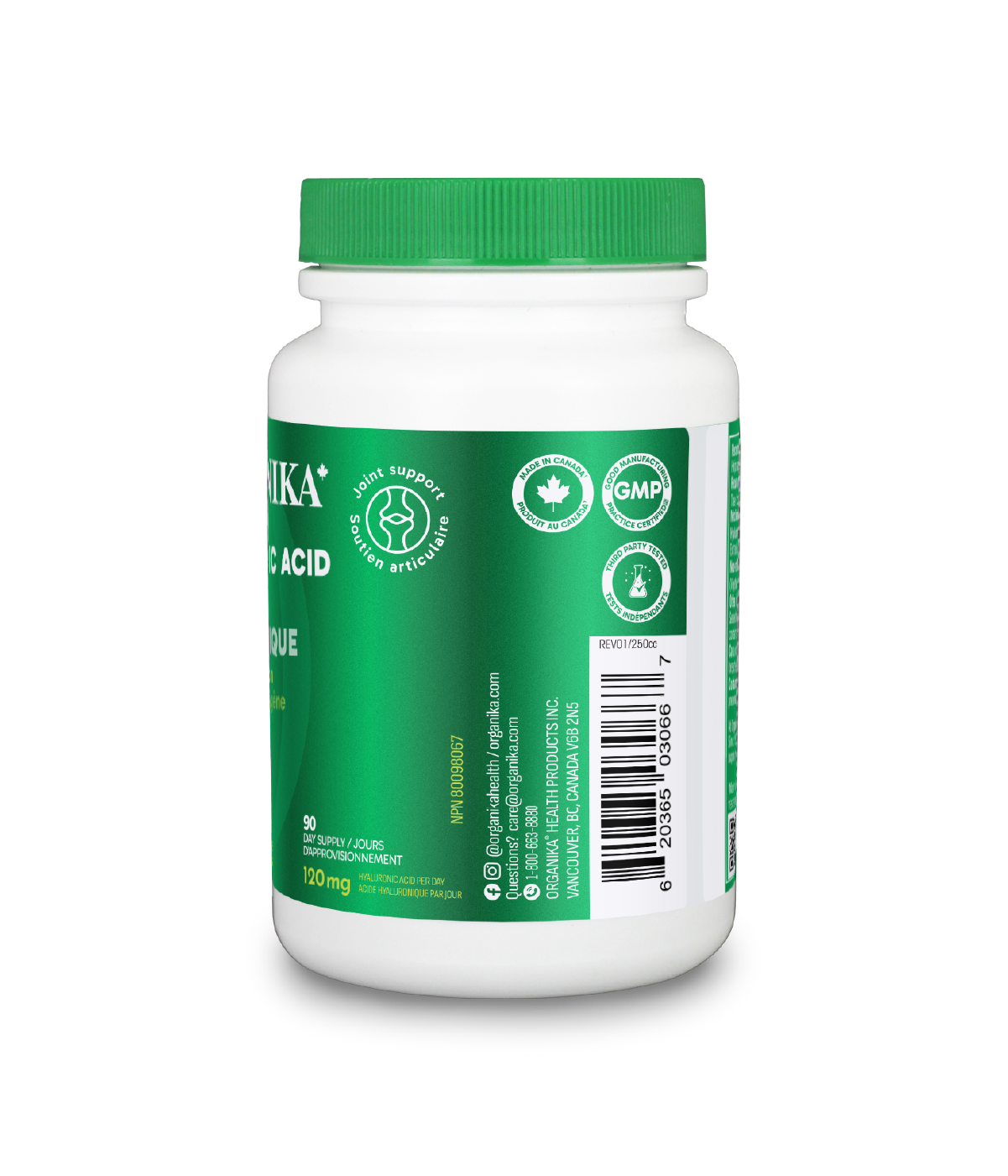
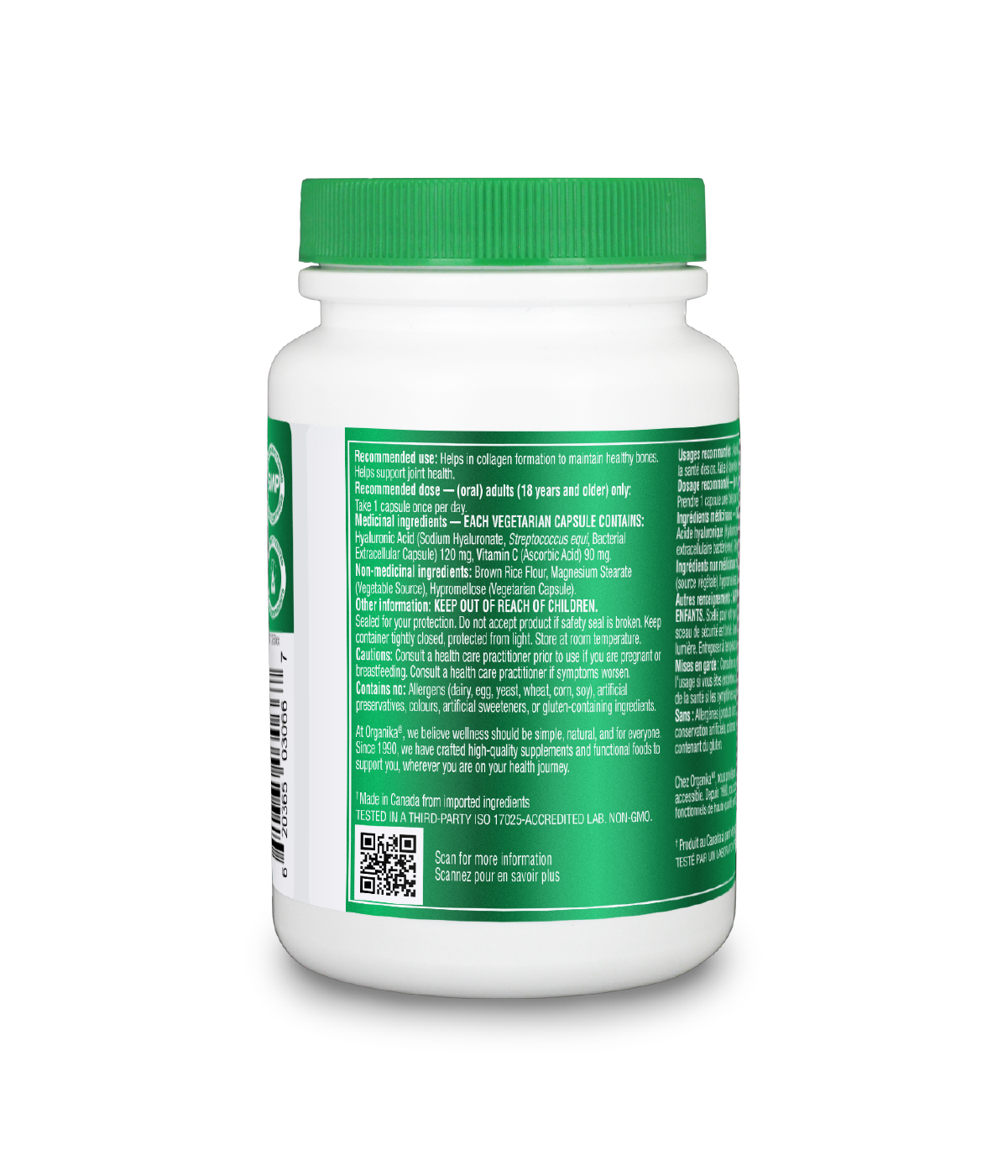
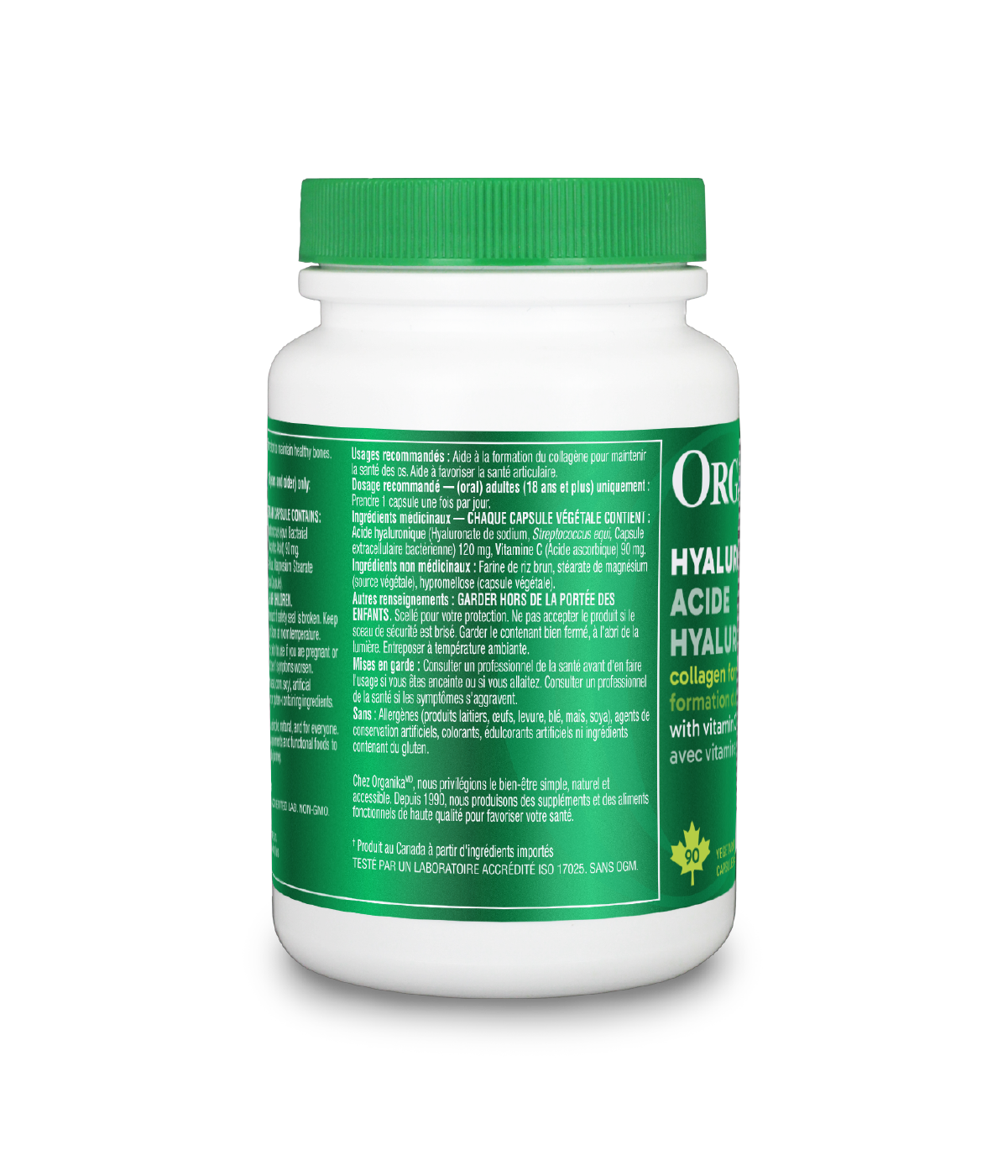




Hyaluronic Acid Capsules
Increases hydration in connective tissues throughout the body
- Supports skin hydration to improve texture and reduce wrinkles
- Helps maintain joint lubrication and flexibility
- Combines hyaluronic acid with vitamin C for enhanced skin and tissue support
- Capsule form for ease-of-use
Impossible de charger la disponibilité du service de retrait



Notify Me When Available
Enter your email and we'll let you know as soon as this product is back
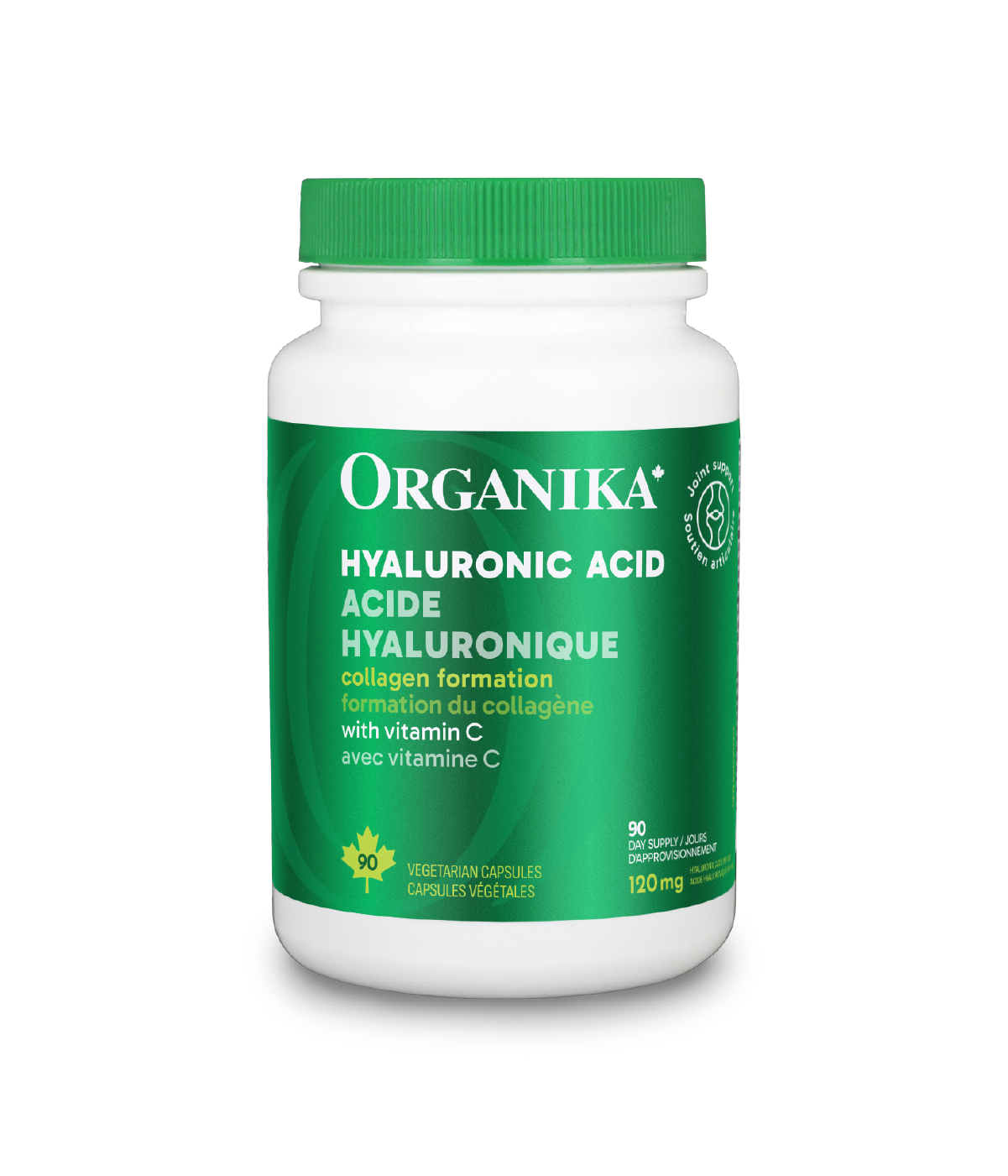
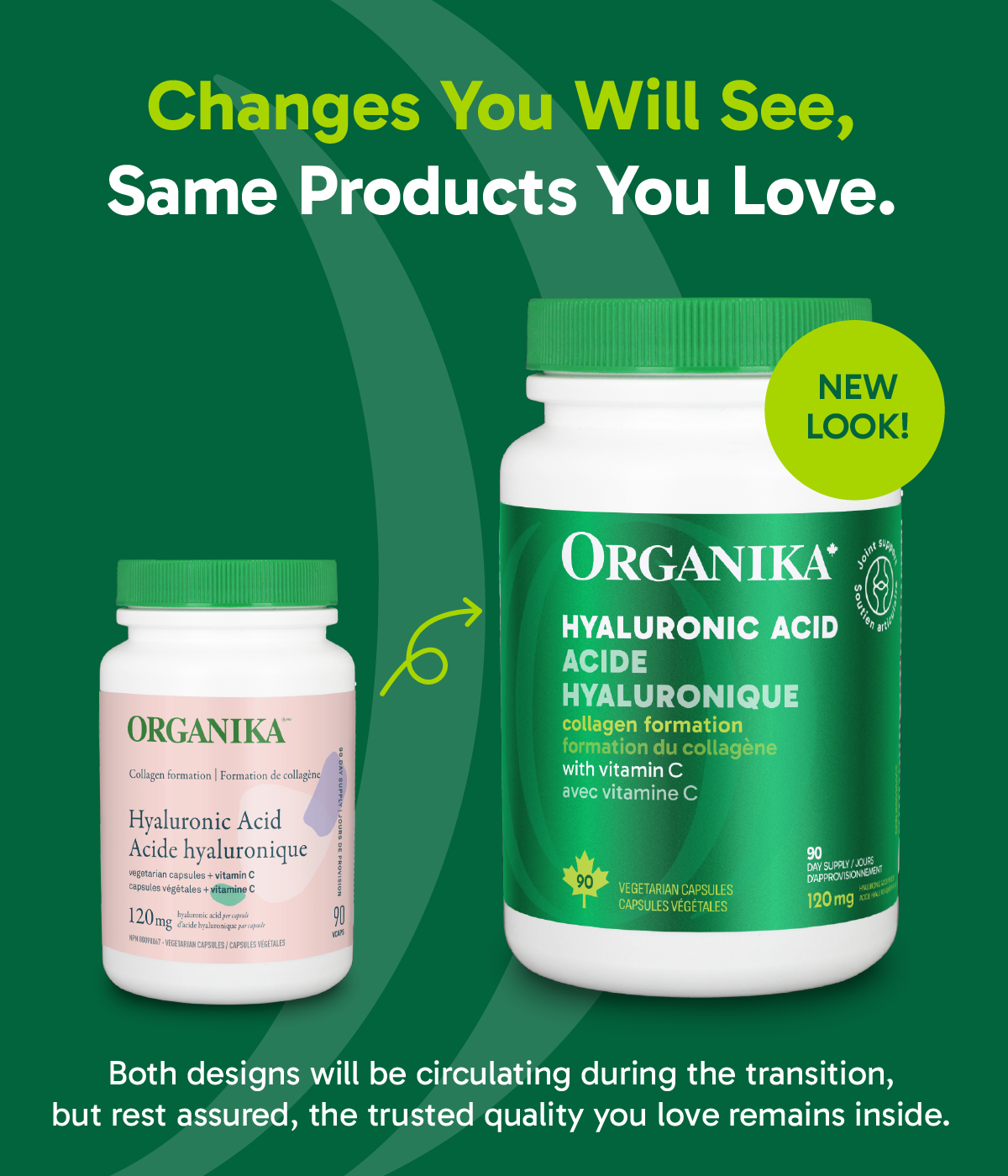
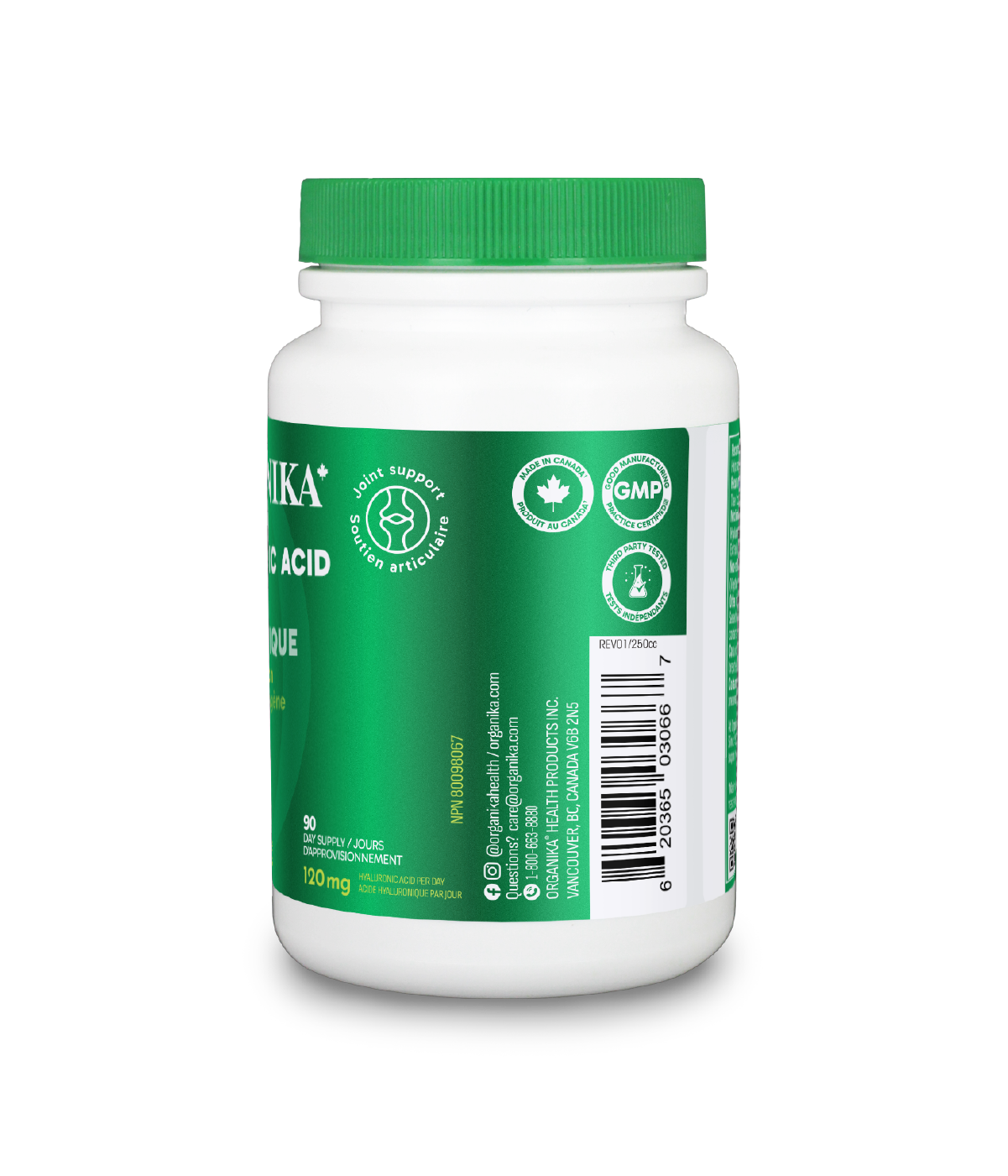
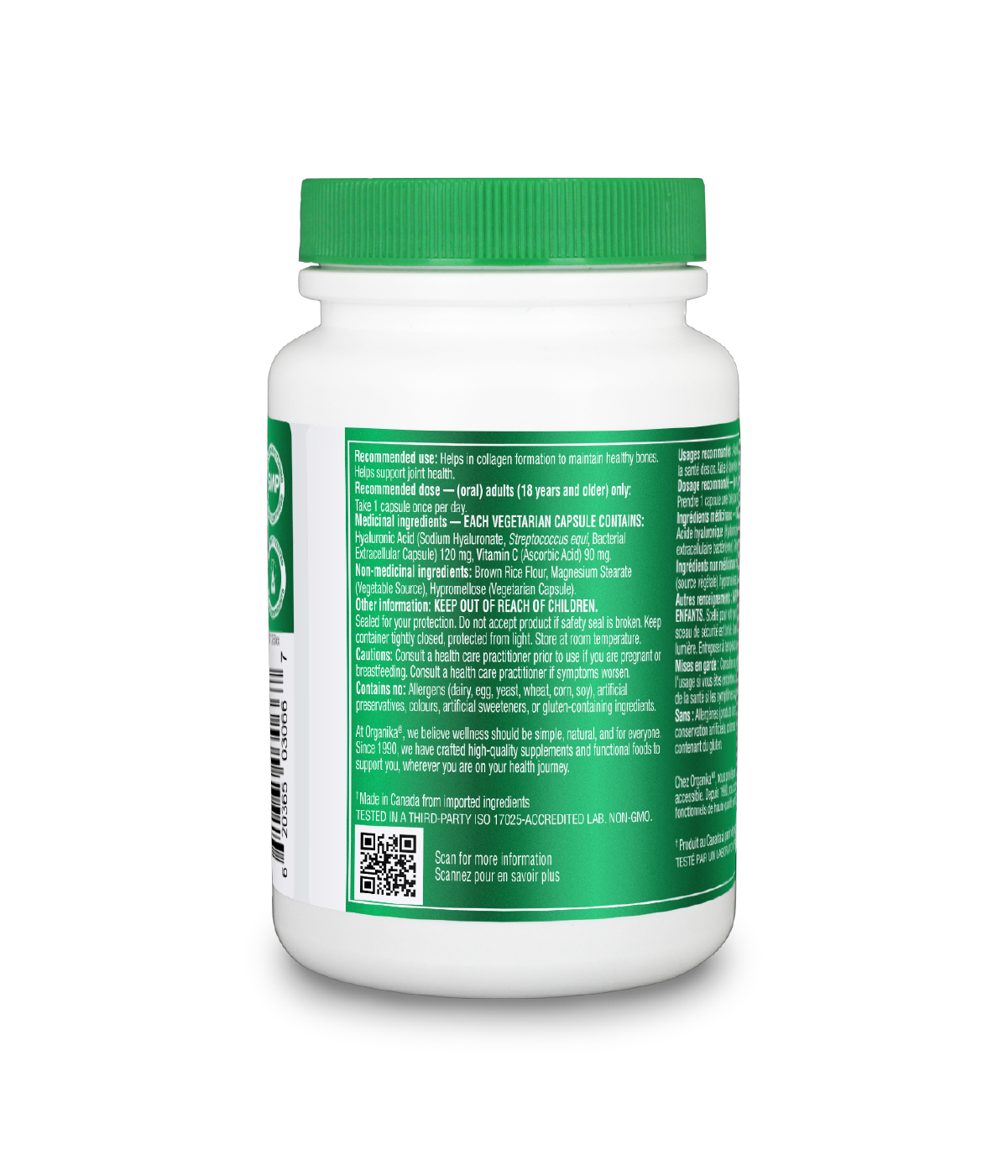
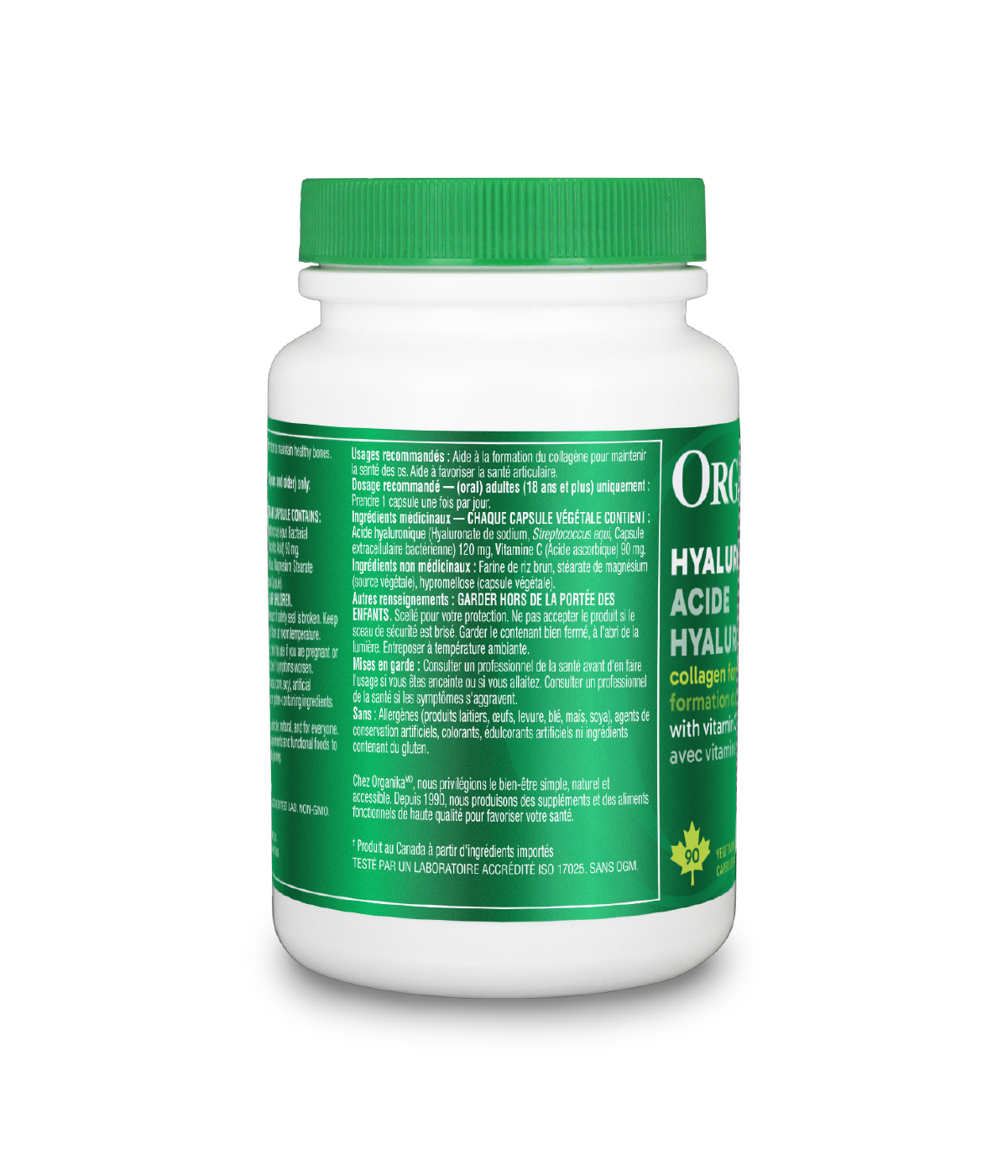





Supplement Facts





Ingredients & Nutrition
MEDICINAL INGREDIENTS - Each vegetarian capsule contains: Hyaluronic Acid (Streptococcus Equi, Bacterial Extracellular Capsule) 120 mg, Vitamin C (Ascorbic acid) 90 mg.
NON-MEDICINAL INGREDIENTS: Brown Rice, Magnesium Stearate, Hypromellose (Vegetarian Capsule).
How to Use: Take 1 capsule once per day.
Is This Right for You?
Do you want to improve your skin's hydration and reduce fine lines?
Are you looking for natural support to maintain healthy joints and reduce stiffness?
Are you interested in a vegan-friendly supplement that combines hydration and joint support?
If you answered "yes" to any of the above, this product is right for you.

-
Combines hyaluronic acid with vitamin C for enhanced skin and tissue support
-
Capsule form for ease-of-use
Ingredients & Nutrition
Recommend For
Do you want to improve your skin's hydration and reduce fine lines?
Are you looking for natural support to maintain healthy joints and reduce stiffness?
Are you interested in a vegan-friendly supplement that combines hydration and joint support?
If you answered "yes" to any of the above, this product is right for you.
Gluten-Free
No Preservatives
Non-GMO
Vegan Friendly
No Artificial Colours or Flavours
Combined hyaluronic acid with vitamin C to deeply hydrate skin, promote collagen production and support healthy joints


The Full Scoop

-
Combines hyaluronic acid with vitamin C for enhanced skin and tissue support
-
Capsule form for ease-of-use
Hyaluronic acid is like your body's natural moisture magnet, found mostly in your skin, joints and connective tissues. Itís key to keeping everything hydrated and feeling good. But as we get older, our supply naturally drops, and that's when you start noticing dry skin and slower repair.
Packed with hyaluronic acid that can hold up to 1,000 times its weight in water, our Hyaluronic Acid Capsules help replenish hydration deep within the skin, smoothing out texture and wrinkles. Plus, with vitamin C added to boost collagen production, this dynamic duo supports healthy bones, joints and that radiant, youthful glow. Vegan-friendly and thoughtfully formulated, it's a simple, effective way to give your body welcome hydration.
Ask Away
We’ve got the FAQs covered. But if you’re still stuck, we’re only a message away.
Get in TouchWhat is sodium hyaluronate?
Our product uses Sodium hyaluronate, which is a water-soluble salt form of hyaluronic acid and is more stable. This form also makes it more resistant to oxidation. Sodium hyaluronate has a lower molecular weight than hyaluronic acid, allowing it to be more readily absorbed.
I'm already using hyaluronic acid topically, why should I consider taking it orally?
Application of topical hyaluronic acid only addresses the skin issues at the surface level and the effect will be diminished gradually, whereas with a supplement the effect will be maintained by taking them continuously. Additionally, supplements can be taken throughout the day to support the inner body such as your joints, bones, and tissues.
What is the source of Organika's hyaluronic acid?
Our hyaluronic acid is fermented from bacterial origin, making this a vegan-friendly product that is safer, purer, and more sustainable.
You'll Likely Also Love...
Hyaluronic Acid Powder
Increases hydration in connective tissues throughout the body
BioCell Collagen Capsules
Reduce joint stiffness and increase skin elasticity in one easy capsule
Enhanced Collagen Protein Original
Canada’s #1 Collagen Powder for healthier skin, hair, nails, joints, and gut
Liga-Joint Premium
Move with ease and maintain healthy joints
Support Beyond Products
Even though collagen seems like a household name these days, many people are still unsure if they should take collagen, or what it can do for them. There are many questions you still have about collagen before it's time to pick up your first bottle, so we want to clear that up! To help you decide if collagen is for you, we’re answering the top 10 things you need to know about collagen: 1. What is collagen? Collagen is a protein, and is what makes up a lot of what is found in our hair, skin and nails. It is referred to as the “glue” that holds our body together. As we get older, however, we're unable to produce the necessary collagen to prevent the signs of aging. This is why many people will supplement with it. 2. Are there negative side effects of taking collagen? For most people, there are no side effects of taking collagen. Most people find that adding collagen to their routine has positive outcomes for their digestive health, hair, skin and nails. However, in rare instances, some people have noticed small breakouts, or light digestive distress when adding collagen to their diet. There has been no definitive correlation between collagen and these issues. 3. How long does it take to see results from taking collagen? There are a few factors that matter here: how long you take it, and what your lifestyle is already like. Generally it can take up to four months to truly see the benefits of collagen in your body. If you are eating a poor diet that lacks the nutrients your body needs to produce its own collagen, and start taking a maximum dose each day, then you may see the effects quite quickly. However if you eat quite healthy and add in about 1 serving per day (approximately 10g), it may take a few more weeks to see the extra glow. 4. Do I need to take collagen every day? It is suggested that you consume around 1 tbsp. of collagen everyday. If you are looking for more therapeutic benefits taking 2-3 tbsps. each day will provide more nourishing, and possibly faster acting effects. As our collagen production starts to reduce with age, taking it regularly will be beneficial for more long-term health effects. 5. Should I take collagen on an empty stomach? Our best suggestion to taking collagen: take it whenever, and however it works best for you! Many people will add it to their morning cup of coffee, while others like it in a pre-bed elixir to help promote a more restful sleep. While some people swear by taking it at a specific time each day, there is no evidence to show that timing matters. So take it whenever works for you! 6. Are there different types of collagen? Yes! You can learn more about the types of collagen here. But we’ll give you the Cole's Notes version now: There are many types of collagen in your body (articles cite anywhere from 15-27 different types of collagen). However, there are three types that are of most importance in our body: Type 1, Type 2, and Type 3. Pretty easy to remember, right? Type 1 collagen is what helps our hair, skin and nails, and can be found in Organika’s Enhanced Collagen, Marine Collagen and Salmon Collagen. Type 2 collagen is found in Organika’s Chicken Bone Broth and BioCell Collagen supplements, and supports joint health. People living with joint issues, like osteoarthritis may find relief from using supplements rich in Type 2 collagen. Type 3 collagen is usually found alongside Type 1 collagen in your body and is an important component of our bone marrow. This is available in Organika's Enhanced Collagen line. 7. Can I make collagen on my own? Your body naturally produces collagen using Vitamin C, and the amino acids, glycine, proline and lysine. This means that yes, if you are eating a primarily plant-based diet, you can still produce the collagen necessary to keep your skin glowing and your hair flowing. However, it is important to remember that our collagen production decreases as we age. That’s likely because our body can’t breakdown and absorb the proper nutrients to create it (like these amino acids and Vitamin C). So including a collagen supplement, or a plant-based booster is helpful! 8. Is collagen just a powder? Collagen can come in various forms, but you’ll usually see it in a powder or capsule form. For example, our Marine Collagen and Enhanced Collagen line are powders that can be added to smoothies, baking, or your morning coffee/tea. Our Plant-Based Collagen Booster is also a powder, however it’s best to use that in cold liquids to ensure you keep the integrity of the vitamins. On the other hand, you can also use Organika’s BioCell Collagen or Salmon Collagen, which both come in capsule form. 9. Can I take different types of collagen at the same time? You can! In fact, Organika even sells a product that includes all three types of collagen in one convenient powder called Full Spectrum Collagen. 10. Can I add hydrolyzed collagen to hot foods or liquids? The process of hydrolyzation means that the collagen has been broken down into a smaller molecule that is better absorbed by your body. Heating the collagen does not degrade the nutrient profile, as it is already broken down to its smallest molecule.
read moreAs we age, our skin wrinkles, thins out, and may lack that ‘youthful lift’. Our joints become stiff and wear and tear can occur with any activity. Although aging is inevitable, thanks to research we continue to find more ways to add ‘grace’ to the aging process. Nowadays, fillers and Botox are a pricey, and sometimes a risky route many individuals will take to sustain youthful looking skin. Creams, lotions and serums can be priced in the thousands, with promises to reverse aging. It can all add up and become not only incredibly expensive, but in some cases not as effective as promised. What if I were to tell you that beyond a balanced daily diet and lifestyle, certain supplements can have a HUGE impact on the way your skin ages and your joints feel? Collagen is an important component of our skin and other tissues, and it needs a few key ingredients to stay strong, plump and glorious. Hyaluronic acid is one of those key ingredients! Hyaluronic Acid Hyaluronic acid (HA), is a naturally occurring substance in your body. HA attracts and holds onto water molecules, and in turn, acts as a natural lubricant for the joints and an internal moisturiser for the skin.1 More than half of our natural HA is found in skin tissues,2 and the rest is abundant in our joints, blood vessels, eyes and more.1 As we age, our natural stores of HA decrease, and this is seen in features of our skin such as wrinkles, which become more noticeable due to the loss of moisture.1 Supplementing with Hyaluronic Acid Taking a HA supplement daily is a targeted way to help with the health of your skin while aging, as well as keeping our joints in tip top shape! HA, alongside collagen supplementation, is a dynamic duo that will promote growth and stability in your tissues. The collagen in your skin needs to be well hydrated to maintain good flexibility, which allows it to avoid being easily broken down. Supplementing with HA is a good daily practice as it degrades quickly in our body3, so replacing it is key. Shop Hyaluronic Acid Summing it up Adding HA alongside a collagen supplement is a great way to boost the overall health of your skin and joints. Eating a diet rich in nutrients, and low in processed foods/sugar, will only compliment this process further. Just like any other supplement regime, it is always a great idea to talk to your healthcare provider before making any major changes. Be happy, be healthy and age gracefully! Amy Wilson References Papakonstantinou E, Roth M, Karakiulakis G. Hyaluronic acid: A key molecule in skin aging. Dermato-endocrinology. 2012 Jul 1;4(3):253-8. Reed RK, Lilja K, Laurent TC. Hyaluronan in the rat with special reference to the skin. Acta Physiologica Scandinavica. 1988 Nov;134(3):405-11. Fraser JR, Laurent TC, Engström‐Laurent A, Laurent UG. Elimination of hyaluronic acid from the blood stream in the human. Clinical and experimental pharmacology and physiology. 1984 Feb;11(1):17-25.
read moreJoint pain can be debilitating and affect people of all ages, whether it's due to osteoarthritis, aging, or high levels of physical activity. Recently, collagen powder has emerged as a popular supplement to support joint health. But does it actually work for alleviating joint pain? Let's dive into the science behind collagen and its potential benefits for joint health. What Is Collagen? Collagen is the most abundant protein in the human body, responsible for maintaining the structural integrity of skin, bones, tendons, and joints. As we age, collagen production declines, contributing to joint discomfort, cartilage deterioration, and other age-related issues. This has led to interest in collagen supplements, especially hydrolyzed collagen powder, which is broken down into smaller peptides that are easier for the body to absorb. Collagen and Joint Health Cartilage—the cushioning material in joints—is made up largely of collagen. Loss of cartilage can cause joint pain and stiffness, common symptoms in osteoarthritis. Supplementing with collagen has been proposed as a way to restore some of this lost cartilage, potentially reducing joint pain and improving mobility. Check out Organika’s Enhanced Collagen Bone & Joint supplement, which contains MSM, chondroitin, glucosamine, and vitamin D3, all designed to support joint health. What Does Research Say About Collagen for Joint Pain? Several studies suggest that collagen supplementation may offer benefits for people experiencing joint pain, particularly related to osteoarthritis and sports injuries. Osteoarthritis Relief: Research suggests that collagen supplements may help alleviate joint pain associated with osteoarthritis. A review of clinical studies concluded that oral collagen supplementation is reasonably effective for reducing pain in people with osteoarthritis, though more research is necessary to fully understand its efficacy (Woo et al., 2017). Joint Pain in Athletes: Athletes who experience joint pain from repetitive strain or injury may also benefit from collagen. A 12-week trial found that athletes who took specific collagen peptides experienced a significant reduction in activity-related knee pain compared to those who took a placebo (Zdzieblik et al., 2017). Similarly, a study on athletes with activity-related joint pain showed that supplementing with collagen hydrolysate over 24 weeks improved measures of joint pain and discomfort (Clark et al., 2008). Hydrolyzed Chicken Collagen: One randomized trial focused on healthy adults with joint discomfort found that hydrolyzed type II chicken collagen significantly reduced joint pain and improved joint function (Mohammed & He, 2021). The participants reported improved mobility and reduced stiffness, highlighting collagen's potential for supporting joint health even in people without diagnosed conditions like osteoarthritis. How Does Collagen Work for Joint Pain? Consuming Organika's collagen is simple, enjoy it with hot or cold beverages, you can even bake wit it. When you consume hydrolyzed collagen it is broken down into smaller peptides that the body can absorb. These peptides may accumulate in cartilage, stimulating your body’s own production of collagen and other components necessary for maintaining healthy joints. This process helps to: Promote Cartilage Repair: Collagen supplements provide the building blocks necessary to support the repair of damaged cartilage, which may improve joint cushioning. Reduce Inflammation: Collagen has been shown to reduce inflammation in the joints, which can lead to pain relief in conditions like osteoarthritis. Improve Joint Lubrication: Some evidence suggests that collagen can help increase the amount of synovial fluid, which lubricates the joints, making movement smoother and less painful. Organika’s Enhanced Collagen Pure Beauty contains 120 mg of Hyaluronic Acid which is fantastic at providing moisture specifically to the synovial fluid in the joints, the eyes and the skin. Controversy Around Collagen for Rheumatoid Arthritis While collagen appears to be promising for osteoarthritis and sports-related joint pain, its effectiveness for rheumatoid arthritis remains controversial. Rheumatoid arthritis (RA) is an autoimmune condition where the body attacks its own joint tissue, and current research has not conclusively shown collagen supplementation to be beneficial for RA sufferers. According to Woo et al. (2017), the benefits of collagen for RA are still unclear and require further investigation. Types of Collagen for Joint Health There are different types of collagen, but type II collagen (found in Organika’s Chicken Bone Broth Protein Powder, Full Spectrum Collagen 1, 2, 3, 5, 10, and Biocell Collagen Capsules) is most commonly associated with joint health because it is found in cartilage. Many collagen supplements, especially those marketed for joint pain, contain hydrolyzed type II collagen derived from chicken or bovine sources. However, blends that include other types, such as types I and III, may provide additional benefits for skin, tendons, and ligaments. How to Take Collagen Powder for Joint Pain Collagen powder is easy to incorporate into your routine—simply mix it into water, smoothies, or coffee. For joint health benefits, studies typically suggest taking 5 to 10 grams of collagen per day over a period of at least 8 to 12 weeks. Organika’s new Lemon Enhanced Collagen Protein is a quick and tasty way to get all the benefits, just add cold water, sip and enjoy. Potential Side Effects Collagen is generally considered safe for most people, with minimal side effects reported. Some individuals may experience mild digestive symptoms like bloating, but these effects are rare. As always, it's a good idea to consult with a healthcare provider before starting any new supplement, especially if you have pre-existing health conditions. Conclusion: Can Collagen Help with Joint Pain? Based on current research, collagen powder shows promise for reducing joint pain, particularly in cases of osteoarthritis and physical activity-related discomfort. Studies have demonstrated that collagen supplementation can improve cartilage health, reduce inflammation, and support overall joint function. While it may not be a magic bullet, collagen could be a valuable addition to your joint care routine. For those struggling with joint pain, consistent use of collagen powder may help alleviate symptoms and promote better mobility over time. However, more research is needed, especially for conditions like rheumatoid arthritis, to fully understand collagen’s role in managing joint pain. References Clark, K. L., et al. (2008). 24-Week study on the use of collagen hydrolysate as a dietary supplement in athletes with activity-related joint pain. Current Medical Research and Opinion, 24(5), 1485-1496. Woo, J., et al. (2017). Oral collagen supplementation for osteoarthritis: A systematic review. The Journal of Arthritis, 6(1), 1-9. Zdzieblik, D., et al. (2017). Collagen peptide supplementation reduces activity-related joint pain in young adults. Journal of the International Society of Sports Nutrition, 14(30). Mohammed, S., & He, J. (2021). Hydrolyzed chicken collagen type II improves joint discomfort in healthy adults: A randomized controlled trial. International Journal of Rheumatic Diseases, 24(3), 305-310.
read more





